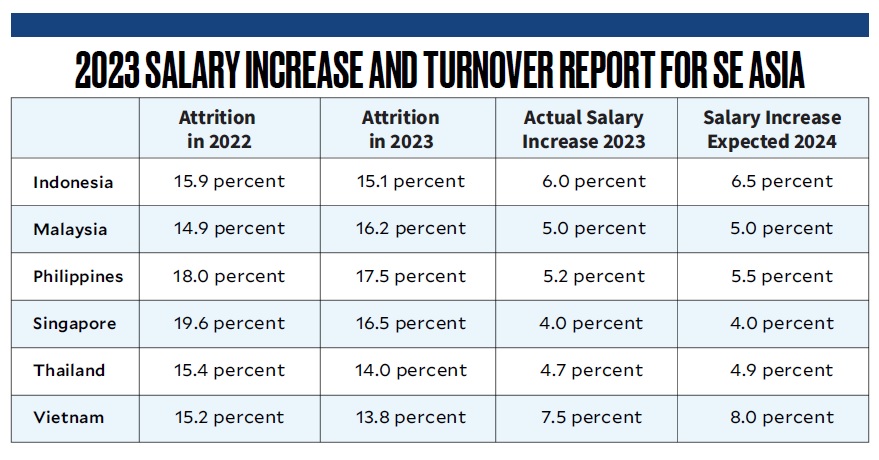Salaries in SE Asia poised to rise in 2024, says Aon survey

While salaries in Singapore and Malaysia are expected to stay flat, the survey found the median salary is expected to increase by 6.5 percent for Indonesia, 5.5 percent for Philippines, 4.9 percent for Thailand and 8.0 percent for Vietnam in 2024.
The projected increase in salaries in Southeast Asia continues to defy economic slowdown concerns. Additionally, attrition rates across Southeast Asia have dropped in 2023 compared to 2022 yet continue to remain in the double-digits a consequence of an ever-changing talent strategy and the ongoing gap between supply and demand of talent.
Attrition rates are the highest in Philippines at 17.5 percent and lowest in Vietnam at 13.8 percent.
Rahul Chawla, partner and head of Talent Solutions for Southeast Asia at Aon said, “As companies navigate new forms of volatility including focusing on costs and investments, salary-increase planning has become challenging across the region. A reassessment of compensation strategies based on advanced analytics is crucial for firms to stay competitive. By leveraging data from within their own organisations as well as the market, companies can make more informed decisions enabling them to not only weather the challenges of an uncertain economic climate but to thrive in an evolving workforce landscape.”
The report further revealed that businesses in Southeast Asia are cautiously optimistic about hiring, with 40 percent of the companies reporting no changes to their recruitment numbers, and 40 percent of companies having hiring restrictions.
Despite an increase in layoffs earlier in the year, Aon’s data shows headcount numbers across industries are still higher than prepandemic levels, with layoffs mainly occurring in the noncore/expansion areas of the business, while they continue to hire for other business lines.
New hire premiums are averaging between 5.6 percent and 13.3 percent, with firms becoming more cautious with compensation spends as they streamline budgets, enhance cost efficiency and reevaluate compensation strategy. This contrasts with 2022, where southeast Asia saw a hiring boom and new hire premiums averaged between 14.7 percent and 23.6 percent.
Alina Cheng, head of Data Solutions, Southeast Asia for Talent Solutions at Aon said, “Firms need to recognize and proactively address pay compression that is the gap in pay between employees regardless of their experience and talent to maintain an engaged, competitive and resilient workforce. When new hires receive higher compensation than long-term employees, firms start to see pay compression issues develop. The unintended consequences of pay compression can lead to higher attrition and a decline in employee morale. By focusing and nurturing talent from within, firms can subsequently decrease the need for new hire premiums while enhancing their organization’s employee value proposition.”
Looking ahead to 2024, salaries across industries also continue to vary in addition to the differences between countries.
The retail industry continues to have the highest budgeted salary increases at 6.1 percent, followed by technology at 6.0 percent, the life sciences and medical devices industry at 5.9 percent, manufacturing at 5.8 percent and financial services at 4.8 percent.
The technology sector is expected to have the highest increase in Singapore (4.5 percent), Indonesia (10.2 percent) and Vietnam (10.9 percent), compared to the manufacturing industry that had the highest year on year salary increase across industries in Thailand (8.0 percent), Malaysia (13.7 percent) and Philippines (14.5 percent).
Across southeast Asia—Malaysia, Philippines and Singapore—more than half of the roles have had salary increases outrun inflation, with Singapore and Philippines having 71.7 percent of salary increases outrunning inflation and Malaysia at 56.4 percent.
However, for Indonesia, Vietnam and Thailand, on average, 70 percent of salary increases lagged inflation. For 67 percent of firms in southeast Asia, inflationary pressures are included as part of their pay policy considerations when reviewing salary increases.
“Southeast Asia has long been a hotbed of economic growth, attracting talent from across the globe. As it confronts the prospect of a looming recession, the dynamics of salary increases, turnover, and workforce stability take on greater significance. In these challenging times, simply increasing salaries is unsustainable for firms as they look to manage profitability and people cost amongst other factors. Having a holistic total rewards strategy based on data and analytics will therefore ensure organisations will attract and retain the right talent and continue to build a resilient workforce,” Cheng added.
The study, conducted in the third quarter of 2023, is based on insights from 950 companies across Indonesia, Malaysia, Philippines, Singapore, Thailand and Vietnam.
